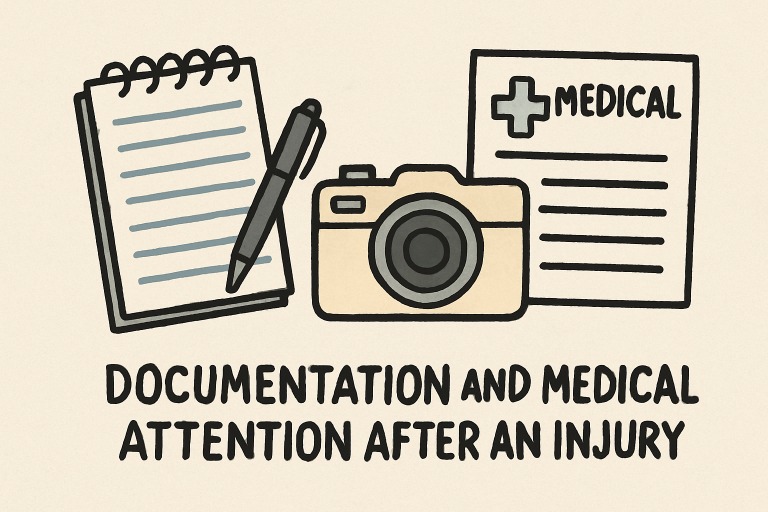Introduction
Dealing with a personal injury claim can be a daunting process, especially when trying to recover from injuries and manage mounting expenses. Fortunately, arming yourself with essential knowledge and having the right support can make a significant difference. Working with a personal injury attorney in Maryland can help protect your interests while guiding you through each step of the legal process. This guide offers essential tips to help claimants navigate their personal injury cases effectively and efficiently, minimizing risks and increasing the likelihood of a favorable outcome.
Understanding the key actions to take—and what to avoid—can help you steer clear of common pitfalls that may jeopardize your case. Employing a thoughtful approach ensures you have the best possible chance to recover fair compensation while remaining focused on your health and recovery.
Seek Immediate Medical Attention
Your health is the top priority following an accident or injury. Even if symptoms appear minor at first, an immediate medical evaluation is crucial. Promptly visiting a doctor not only ensures that all injuries are professionally assessed and treated but also generates a detailed medical record that serves as critical evidence for your claim. Insurance companies may use any delays or gaps in treatment to challenge whether your injuries were caused by the accident or to downplay their severity.
Always follow the prescribed treatment plan and attend all follow-up appointments. Consistent medical documentation demonstrates to insurers and courts that you are taking your recovery seriously and that your injuries are legitimate.
Document the Incident Thoroughly
Personal injury claims require strong evidence, and after an incident, it’s crucial to collect and preserve documentation. Take clear photographs, gather contact information from witnesses, and keep a comprehensive file of medical bills, prescription receipts, lost wages, and correspondence. Maintain a personal injury journal to record daily symptoms, pain levels, and the injury’s impact on work or life. This detailed record can support your claim, clarify the full impact of your injuries, and counter insurers’ attempts to minimize your suffering. This will help you build a strong case and protect your rights.
Consult with a Personal Injury Attorney
Pursuing a personal injury claim without legal expertise can leave you vulnerable to tactics that benefit insurance companies or negligent parties. An experienced personal injury attorney provides crucial guidance, ensuring you understand your rights and obligations at every stage. Your attorney will advise you on the documentation needed, communicate with insurers, negotiate fair settlements, and, if necessary, represent you in court.
Legal professionals not only interpret complex laws and procedural rules, but they also know the value of different types of compensation—including costs for ongoing care, lost future income, and pain and suffering. With an expert on your side, your claim is presented as strongly as possible and you avoid unintentional errors that could undermine your recovery.
Be Cautious with Insurance Companies
Many accident victims are surprised to learn that insurance adjusters are not on their side. It is in the insurer’s interest to resolve claims quickly and to pay out as little as possible. Adjusters may request recorded statements or urge you to accept early settlement offers before you know the full extent of your injuries or losses. Providing statements or signing documents without legal advice can have long-lasting negative consequences.
Always direct all communications with insurers to your attorney. Your legal counsel understands how to negotiate with insurers and will work to ensure any offer reflects the true cost of your injuries and associated suffering. By channeling all communication through your attorney, you avoid exposing yourself to manipulative tactics or inadvertently weakening your claim.
Avoid Discussing Your Case on Social Media
Social media posts can easily be misconstrued or taken out of context and used against you by insurance companies or opposing attorneys. Even innocent posts about daily activities can be interpreted as evidence that you are not as injured as you claim. For this reason, refrain from posting updates, photos, or information about your accident, injuries, or recovery on any platform while your case is active.
Discuss privacy settings with your attorney, but even secure profiles are not immune from scrutiny through legal discovery. Limiting your online presence during the claims process is the best way to prevent unintentional harm to your case.
Understand the Statute of Limitations
The statute of limitations is the legal deadline for filing a personal injury lawsuit, which typically ranges from one to six years after the injury occurred. Failure to file within this timeframe can result in permanent forfeiture of compensation, regardless of the severity of the injury or the clarity of the evidence. It is crucial to consult an attorney early to determine the statute of limitations applicable to your case, as it allows time for investigation, evidence collection, and case preparation before the deadline. Following these steps can increase your chances of obtaining justice and fair compensation for your loss and suffering.

